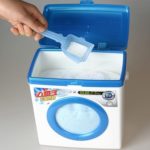How much powder should be poured into the washing machine? The majority decide this question according to the principle "The more, the better and better the laundry is washed." But this approach is fundamentally flawed. This article provides calculations of how much powder is needed per wash cycle in order not to harm and reduce costs.
What happens if you pour a lot?
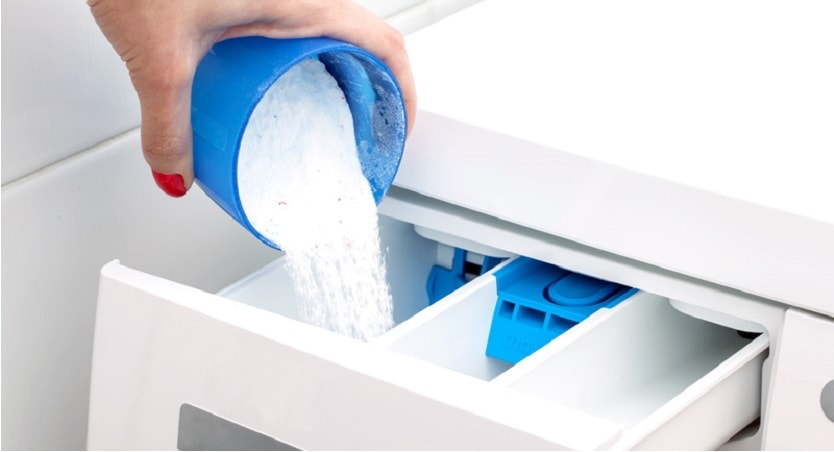
The automatic machine uses a strictly defined volume / amount of water per wash cycle. If you use a lot of powder, you may not have enough water to rinse your laundry well. As a result, after drying, white streaks will remain on it. And the problem is not only in the unsightly appearance, the remains of the powder can cause allergy attacks. Incomplete rinsing of chemicals for children is especially dangerous.
Large amounts of powder may not be completely washed out of the tray, residues will accumulate on the walls and may cause blockages in the feed. Also, excessive use of detergents can lead to an unpleasant odor in the drum and the formation of mold.
![]() See also - How to properly wash woolen items in a washing machine?
See also - How to properly wash woolen items in a washing machine?
Should you trust the manufacturer
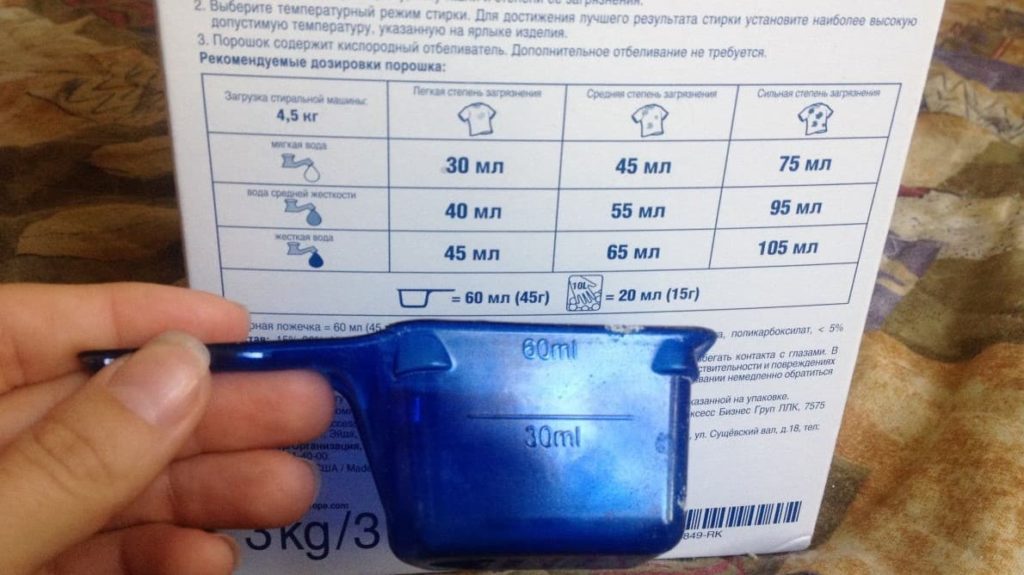
On the packaging of each detergent there is an instruction in which the manufacturer describes in detail how much powder is needed for a particular type of wash. But you shouldn't blindly trust this information - the manufacturer deliberately overestimates the consumption rates. After all, the more it is used, the sooner the buyer will come for a new package.
Manufacturers generally recommend using 150 grams of powder for one complete wash cycle in soft / medium hard water. If there are difficult stains, it is recommended to increase the amount of detergent by 50 percent - as a result, the required dose will be 225 g. With hard water, you will need to add another 20 grams. In total - a pack of powder weighing 1 kg is enough for only 4 washes.
Independent experts recommend that to wash one kilogram of medium-soiled laundry, 1 tablespoon of powder is required - this is on average about 25 g. Based on this, only 100 grams will be required to wash 4 kg of laundry (weighed dry).
![]() See also - What powder to choose for a washing machine
See also - What powder to choose for a washing machine
Falling asleep the powder: what to consider
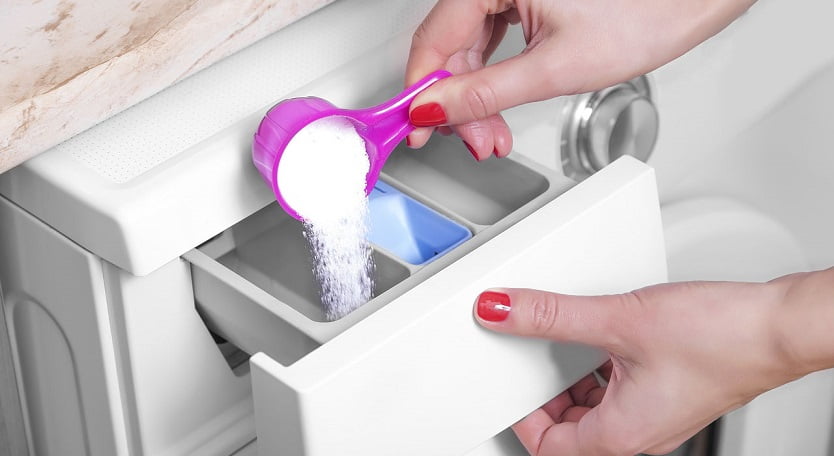
How much powder to pour into the washing machine is influenced by a number of factors that need to be known and taken into account:
- Water hardness - the higher this indicator, the worse the foam forms, which means that the detergent penetrates the fabric more weakly. As a result, the quality of the wash is reduced.To improve the quality of washing, you can use special additives that soften the water, the simplest of which is ordinary soda. In addition, special tablets and soda-based products are available. Another positive aspect of using such funds is that the electric heater is protected from scale formation.
- How dirty the laundry is - the dirtier the laundry, the more powder will be needed. But not always ordinary powder (even the highest quality, from well-known manufacturers) is able to cope with difficult stains. Increasing the amount of powder does not always affect the quality of the wash. Therefore, the consumption can be reduced by first pre-soaking the laundry and treating the stains with special agents. It can be either a stain remover, or a concentrated liquid (gel), or rub the stain by hand with regular detergent.
- Water consumption - each program corresponds to the consumption of a certain amount of water, which depends on the type of fabric, the intensity of the wash, etc. Some modern models have scales built into the drum. After loading the laundry, the machine independently weighs and, taking into account the type of laundry and the set mode, adjusts the amount of water consumed. In this case, the amount of powder used is determined as indicated above: the weight of dry laundry is multiplied by 25 g. In other automatic machines, the amount of water consumed for a certain mode does not depend on the loaded laundry. Consumption is indicated in the instruction manual. In this case, the rules for calculating the amount of powder poured into the tray change somewhat. For example, according to the instructions, the machine will need 65 liters of water to wash 5 kg of dry laundry. If you load only 3 kilograms, the washer still consumes 65 liters. If you fill in only 75 g of powder, then the water will greatly dilute it, the concentration of the foam may be insufficient to ensure the quality of the wash. In this case, the powder is poured based on the maximum load of the machine.
Important:
To get the most efficient use of powder, electricity and water, try to use the washing machine's maximum load.
![]() See also - Which container for washing powder to choose
See also - Which container for washing powder to choose
Powder-saving features
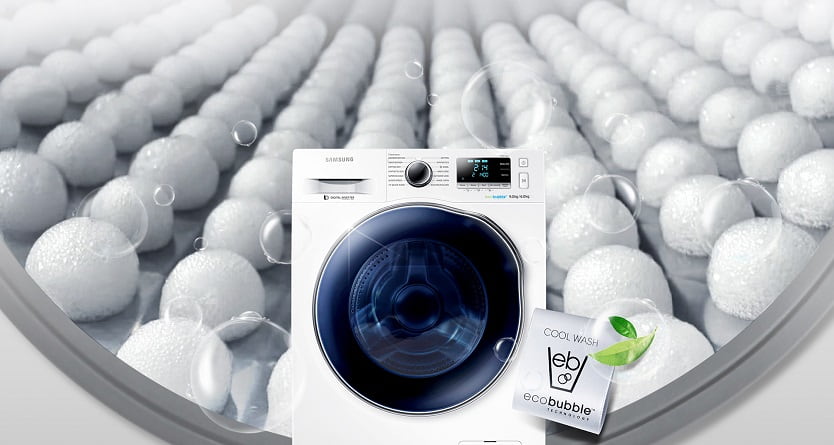
In some models of washing machines, manufacturers have provided special functions that make it possible to additionally save on detergents:
- EcoBubble - the powder pre-goes into the foam generator, where it dissolves completely. After that, in fact, in the form of foam, it is fed directly into the drum, onto things. In this form, it penetrates into the fabric much more efficiently, washing even stubborn stains.
- Steam wash - the laundry in the drum is treated with a steam jet. This softens the fibers, which improves the penetration of the soap suds. In addition, steaming eliminates nearly 90% of allergens.
- Quick wash (quick wash) - used for lightly soiled laundry. In this mode, water consumption is significantly reduced, as a result, the powder consumption can be selected in direct proportion to the weight of the laundry, per kilogram - 25 g.
Detergent types
In addition to the washing powder itself, manufacturers offer various gels, tablets and capsules. You won't be able to save money using tablets or capsules. In the case of concentrated gel, manufacturers indicate in the instructions the consumption of 100 ml for one wash cycle. In practice, one tablespoon of concentrated gel is enough for a high-quality wash.
How to check water hardness in an elementary way
It is quite easy to do this without any laboratories and samples. Start washing in the machine without adding detergent. If you see the water bubbling, then it is soft. If there is not a single bulb, then, obviously, tough. In conclusion, I would like to recall a rather well-known statement by Seneca: “Nature searches us at the exit, as at the entrance.You can't bear more than you brought. ”
![]() See also - Which compartment to pour the powder into in the washing machine
See also - Which compartment to pour the powder into in the washing machine

